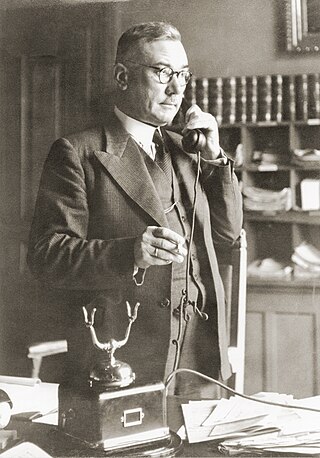Related Research Articles

Political identity came to the territory now occupied by the Principality of Liechtenstein in 814, with the formation of the subcountry of Lower Rhætia. Liechtenstein's borders have remained unchanged since 1434, when the Rhine established the border between the Holy Roman Empire and the Swiss cantons.

The German National Movement in Liechtenstein was a Nazi party in Liechtenstein that existed between 1938 and 1945.

Walter Kieber was a lawyer and politician from Liechtenstein who served as Prime Minister of Liechtenstein from 1974 to 1978.
Liechtensteiner Vaterland is the largest daily newspaper in Liechtenstein. Published by Vaduzer Medienhaus AG, it is the official newspaper of the Patriotic Union party.

General elections were held in Liechtenstein on 31 January and 2 February 1986. The result was a victory for the Patriotic Union, which won 8 of the 15 seats in the Landtag. The Progressive Citizens' Party won seven seats, whilst the new Free List narrowly failed to cross the 8% electoral threshold and did not obtain representation. The coalition government of the FBP and the VU continued.

General elections were held in Liechtenstein on 3 and 5 March 1989. The result was a victory for the Patriotic Union, which won 13 of the 25 seats in the Landtag, which had been enlarged by 10 seats compared to the 1986 elections. Voter turnout was 90.88%. Early elections were called following the Progressive Citizens' Party's Landtag members resigning in protest due to the VU refusing to support an investigation into power abuse by the Liechtenstein state court in 1985.

Diplomatic and economic relations between Switzerland and Liechtenstein have been close, with Switzerland accepting the role of safeguarding the interests of its smaller neighbour, Liechtenstein. Liechtenstein has an embassy in Bern. Switzerland is accredited to Liechtenstein from its Federal Department of Foreign Affairs in Berne and maintains an honorary consulate in Vaduz.

General elections were held in Liechtenstein on 4 April 1939. Although a new system of proportional representation had been introduced to pacify voters at a time when the country was under threat from neighbouring Nazi Germany, it was not used and the elections became known as the "silent elections" as no actual vote was held. Instead, the governing Progressive Citizens' Party and opposition Patriotic Union formed a coalition, assigning a roughly equal number of seats each, in order to prevent the German National Movement in Liechtenstein from acquiring any seats in the Landtag.

Franz Josef Hoop was a Liechtensteiner diplomat and politician who served as Prime Minister of Liechtenstein from 1928 to 1945. Hoop is best known for his efforts to retain Liechtenstein's neutrality and independence during World War II. Serving for seventeen years, he is the longest-serving prime minister in the country's history, ahead of his successor Alexander Frick by 79 days. He served under the reign of Johann II, Franz I and Franz Joseph II, making him the only prime minister to serve under three Princes of Liechtenstein consecutively.
The Christian-Social People's Party, often shortened to People's Party, was a social liberal political party in Liechtenstein. Founded in 1918, the Christian-Social People's Party and the Progressive Citizens' Party (FBP) were the first political parties in Liechtenstein.

Liechtenstein Homeland Service was a political party in Liechtenstein that advocated corporate statism and the abolition of party politics.

Alois Vogt was an advocate and political figure from Liechtenstein who served as the Deputy Prime Minister of Liechtenstein from 1938 to 1945.

Anton Frommelt was a pastor and political figure from Liechtenstein who served as the Deputy Prime Minister of Liechtenstein from 1933 to 1938. He was also President of the Landtag of Liechtenstein from 1928 to 1944.

Ludwig Marxer was an advocate and political figure from Liechtenstein who served as the Deputy Prime Minister of Liechtenstein from 1928 to 1933.

Peter Marxer was an advocate and political figure from Liechtenstein who served as the president of the Progressive Citizens' Party from 1970 to 1982. He also oversaw the law firm Marxer & Partner Rechtsanwälte from 1962 until his death.

Wilhelm Beck was an advocate and political figure from Liechtenstein who was one of the founders of the Christian-Social People's Party and served as the President of the Landtag of Liechtenstein from 1922 to 1927.
The 1939 Liechtenstein putsch, also known as the Annexation putsch was an unsuccessful coup d'état by the German National Movement in Liechtenstein on 24 March 1939 designed to provoke Liechtenstein's annexation by Nazi Germany.
Richard Meier was a dentist and political figure from Liechtenstein who served as the President of the Progressive Citizens' Party from 1945 to 1970.
References
- 1 2 3 4 Marxer, Wilfred (31 December 2011). "Liechtensteinischer Freiwirtschaftsbund". Historisches Lexikon des Fürstentums Liechtenstein (in German). Retrieved 28 February 2024.
- ↑ Marxer, Wilfred (31 December 2011). "Liechtensteinische Freiwirtschaftliche Zeitung". Historisches Lexikon des Fürstentums Liechtenstein (in German). Retrieved 28 February 2024.
- ↑ Büchel, Donat (31 December 2011). "Ude, Johannes". Historisches Lexikon des Fürstentums Liechtenstein (in German). Retrieved 28 February 2024.